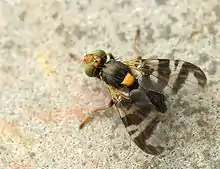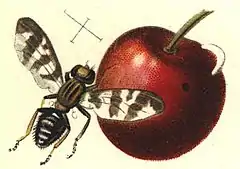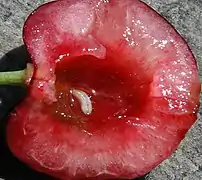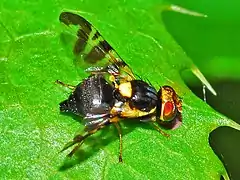Rhagoletis cerasi
Rhagoletis cerasi (the cherry fruit fly or European cherry fruit fly) is a species of fruit fly in the family Tephritidae.
| Rhagoletis cerasi | |
|---|---|
 | |
| Scientific classification | |
| Domain: | Eukaryota |
| Kingdom: | Animalia |
| Phylum: | Arthropoda |
| Class: | Insecta |
| Order: | Diptera |
| Family: | Tephritidae |
| Genus: | Rhagoletis |
| Species: | R. cerasi |
| Binomial name | |
| Rhagoletis cerasi | |
| Synonyms[1] | |
|
List
| |
Distribution
This species is widespread in most of Europe, except British Islands, in western Siberia to Caucasus, in Kazakhstan, Central Asia and Altai.[2] It was first detected in North America in 2016.[3]
Description
Rhagoletis cerasi can reach a body length of about 3.5–5 mm (0.14–0.20 in).[4] These small fruit flies have a shiny body, dark brown, almost black. Mesonotum shows silvery vittae. The wings are transparent, with four transverse dark stripes.[4] Eyes are green with reddish reflections. The head is brown, while scutellum and the legs are yellow.[5]
This species is very similar to Rhagoletis berberidis.[5]
Biology
The adults can be found from late May to early July.[4] They feed on the sugary secretions produced by the cherry itself or by insects (such as the aphid honeydew). After 10–15 days the females lay 50-80 eggs[4] one at a time in the pulp of the fruit. After 6–12 days[4] the eggs hatch and white legless larvae 4–6 mm long[4] come out and feed on the pulp of the fruit. During the ripening the larvae leave the fruit and pupate in the soil,[4] where they overwinter. Usually this species have one generation every 1–2 years.[4]
These fruit flies are considered a major pest of cherry crops [6] in Europe and Asia. They damage also the fruits of apricot, honeysuckle, barberry, bird cherry and snowberry.
Gallery
 Drawing of cherry fruit fly
Drawing of cherry fruit fly Larva in a cherry fruit
Larva in a cherry fruit Image
Image- Video clip
Bibliography
- Luigi Masutti, Sergio Zangheri, Entomologia generale e applicata, Padova, CEDAM, 2001, p. 745-746, ISBN 88-13-23135-0. (in Italian)
- Mario Ferrari, Elena Marcon; Andrea Menta, Fitopatologia, Entomologia agraria e biologia applicata, 3rd ed., Bologna, Calderini Edagricole, 2000, ISBN 88-206-4159-3. (in Italian)
References
- Catalogue of Life
- Fauna Europaea
- Wakie, Tewodros T. (2018). "Assessing the risk of establishment of Rhagoletis cerasi (Diptera: Tephritidae) in the United States and globally". Journal of Economic Entomology. 111 (3): 1275–1284. doi:10.1093/jee/toy054. PMID 29528438.
- Mouche de la cerise (in French)
- V. A. Korneyev, S.V. Korneyev, R. I. Mishustin The Carpomyini Fruit Flies (Diptera: Tephritidae) of Europe, Caucasus, and Middle East: New Records of Pest Species, with Improved Keys
- Biological control of the cherry fruit fly, Rhagoletis cerasi L. (Diptera, Tephritidae) by use of entomopathogenic nematodes: first experiences towards practical implementation
External links
 Data related to Rhagoletis cerasi at Wikispecies
Data related to Rhagoletis cerasi at Wikispecies Media related to Rhagoletis cerasi at Wikimedia Commons
Media related to Rhagoletis cerasi at Wikimedia Commons- Les Insectes (in French)
- Kirschfruchtfliege (in German)
- Species Profile: European Cherry Fruit Fly (Rhagoletis cerasi), National Invasive Species Information Center, United States National Agricultural Library